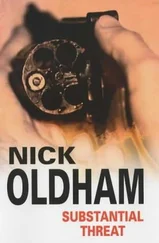He covered his chest and shoulders with the Witch’s medicaments and felt immediate physical relief. He wasn’t sure he approved, until he tested and found that beneath the cool there was still a burn, an awareness which promised later discomfort in the abused meat of his back: earned pain, solid and reassuring. In the meantime, his mind was clear, albeit a little tinny, as if he was hearing his own thoughts on a cheap recording. He sent a message to London, tersely worded and laconic, indicating a fatal shooting incident at a local café and the apprehension of those responsible by an armed force. He did not specify the nature of the armed force. That sort of thing would require further discussion.
Shola would be buried today. Mancreu custom was in this regard more Muslim than Christian. The Sergeant dressed accordingly, formal and uncomfortable, squeezing himself into a uniform he had not expected to put on again until he went home and was formally retired from combat duty. He wore his medals. He had a surprising number of them, the real kind, not the ones you got for turning up. Although turning up was no mean thing, some days. He stared at his chest: bright-coloured ribbons, discs and stars.
He couldn’t go for a walk like this, not outside. The heat would flatten him. It would be bad enough at the service. So he walked along the cool, dark corridors of Brighton House, going from one end to the other and hearing the sound of his heels and toes tapping on black and white tiles. Click clack. Click clack . The house seemed to approve, whatever ghosts it might have peering down from the rafters and out of the shrouded rooms, and nodding to see a British soldier in full rig once again marching here in the aftermath of bloodshed and victory. Or possibly it was mice, or bats. There had been a bat last year, lost and confused. He had shepherded it out into the darkness and it had crapped on him.
He sat in the comms room and waited for the phone call, and when it came it was from someone he didn’t know, Marie’s brother. Shola was to be buried at eleven. The Sergeant’s presence would be appreciated, but would he mind coming as a civilian? Shola had not approved of war.
In theory this required permission from a senior protocol officer. There wasn’t one, so the Sergeant petitioned the Brevet-Consul. Sometimes when he did this he actually spoke both parts, making his own voice more gruff and giving the Brevet-Consul a slightly breathy way of speaking which was to his ear suitably posh. This time he just decided that the Brevet-Consul gave his consent. The Sergeant told Marie’s brother he entirely understood, and went to change. He wore a pair of light trousers and a white shirt, with a strip of black cloth around the arm. He had to tear the cloth from a blind in the old pantry, and trim it.
The last time he had been to a funeral it had been his mother’s, in a funeral house a hundred miles north of London. It had been a pretty cottage with wisteria and roses and a circle of sweet, pink flowers he couldn’t name. Someone had taken care with the hedges, too, so that they were neat without being prim. You parked off to one side in a maze of privet which gave everyone a secluded place to arrive and feel sombre. All in all, if somebody had to die and be burned to ash, this was as good a place as any.
The effect was rather spoiled by the industrial metal chimney poking out over the tiled roof, and the column of off-white smoke which rose from it. Mr Willoughby’s was doing a too-good business, and while the good man had not double-booked himself, he had grown careless of the time needed to clear one cremation and bring in the next. Even if he hadn’t, though, the chimney would have ruined it all. It was bold and silvered and wide, like the gun from which the human cannonball is fired, to the delight of small children and scantily clad assistants. Lester couldn’t stop thinking of his mother being expelled straight up and out in her velour dressing gown, her hand still clutched around her wretched, capacious handbag. He wondered where she would land, and hated himself. But it was funny, you couldn’t escape that.
And it got worse. The hall was beautiful, with a double row of stone pots filled with flowers around the walls. No one had mentioned this to the attending pastor, who was allergic to something in the arrangements. His eyes swelled as he gave the eulogy, his nose ran and he could barely form the words. When he did, he sounded less like a speaker for the dead and more like the speaker on a bad railway train announcing something you can’t understand.
‘Fnorbree fnorry to hew hfidawl rebd, ibb de bnabe obb Jebub Hbrised, ouah blord abb fnabior.’
The pastor spoke for twenty minutes, his impenetrable snuffles rising and falling and soaring to the rafters, and while it began as infuriating and grotesque it ended up boring beyond anything anyone had ever experienced. They had come to be moved, or to move themselves, to weep and say some kind of farewell, to whatever extent you can say goodbye to what is already a husk. But it was impossible to feel anything in the funeral house with the bunged-up vicar exhorting you to pray ‘add oub fadeb fnord udd’ and the burnished cannon of a chimney rearing out of the roof.
On Mancreu, things were different. They gathered by a little plot at a cemetery on the very edge of the Beauville shanty, where the inhabited part of the island began to blend with the deep brown mountains and the jungle interior. It was a fitting spot. The town Shola had lived in made a respectful curve around the churchyard, acknowledging that even the dead need their privacy. This was a transitional place, belonging partly to the human world and partly to the great green mass on the other side. And if Shola had believed in cremation and never told, well, in a few months or weeks, Mancreu would burn, and any remnant of Shola would burn too.
The Sergeant stood next to the Witch, the broad shadow of Dirac the Frenchman a little to one side, and Beneseffe the Portmaster beyond him, all of them staring down into the hole someone had dug. Pechorin, the Ukrainian officer, was at the back in full uniform. The Sergeant guessed he had not been allowed to come in civvies.
The boy was not immediately apparent. Sometimes he would watch things he deeply cared about from a high vantage point, through an old, vastly heavy pair of field glasses he had bought on eBay. It was as if he feared being burned by too much passion, as if the emotions of others might wake in him a response he would then be utterly unable to control. The Sergeant hoped desperately that his friend would come in person to this occasion, because he thought the boy would regret it deeply if he did not, now and for ever.
Shola’s coffin was a long basket made of straw, bound with ropes of tomato stem. The only flowers were woven into the coffin itself, wild flowers and sprigs of thorn, and a few wickedly greenish-purple leaves of marijuana from his own crop. The basket was anonymously shaped; it had no head and no foot. The Mancreu men — Shola’s cousins and some sturdy dockmen — lowered it in an old piece of fishing net, and Ma Tatin who owned the chandlery sang something old and deep.
Standing at the head of the grave, Marie thanked them all for coming and said Shola had been a good man and that she had loved him even when he was a pain in the arse. For a moment it seemed that she had more to say, a full eulogy, but she just stood there as if at attention and the Sergeant realised that there were tears on her face and that she would stand there until someone took her away. Shola’s cousin Tom shepherded her gently back to her mother, and then said straightforwardly that he would be taking over the café but that anyone who felt they had a stake in it should come and see him and he’d cut them in. The Sergeant wondered why he wasn’t more cautious. Someone might take advantage. And then he wondered ‘of what?’ What sort of idiot would come and demand a part of a failing enterprise on an island which would not exist by the end of the year?
Читать дальше
Конец ознакомительного отрывка
Купить книгу











